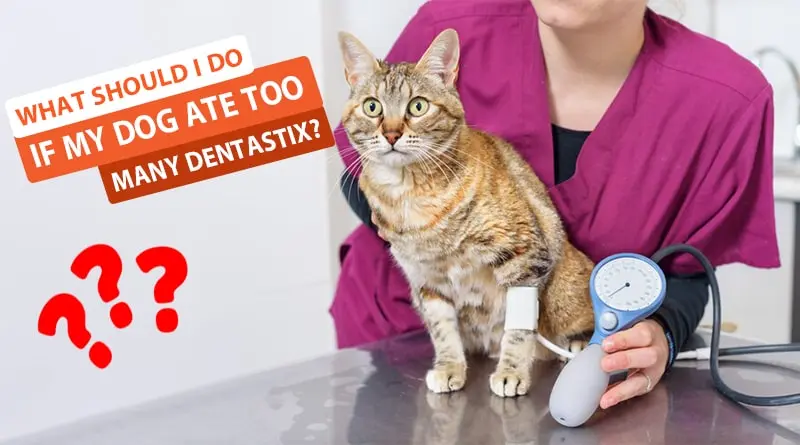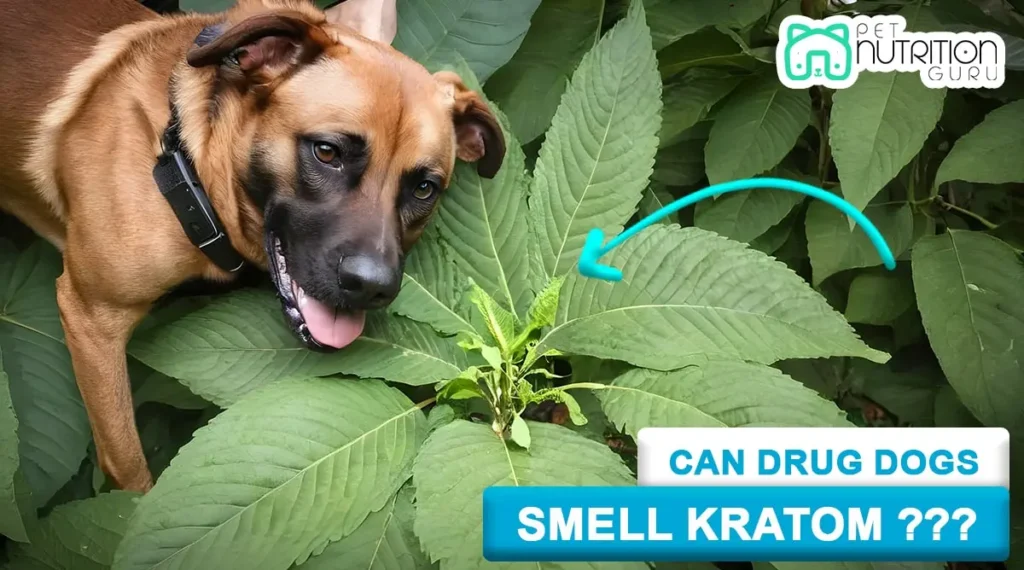What is Dentastix?
Dentastix, those familiar dental chews produced by Pedigree, is popular among dog owners who prioritize their furry friends’ oral hygiene. These treats are designed to promote healthy teeth and gums in dogs, making them a common choice for pet parents looking to keep their canine companions’ mouths in tip-top shape.
What Happens If a Dog Eats Too Many Dentastix?
“If a dog eats too many Dentastix, potential issues include Upset stomach, Weight gain, Dental problems, Nutritional imbalance, Obesity risk, and Altered behavior.“
In this article (What Happens if a Dog Eats Too Many Dentastix), we will discuss the effect of eating too many Dentastix and how we make our dog safe.
What Can Happen If My Dog Ate Too Many Dentastix?

While Dentastix can be beneficial in moderation, there can be consequences if your Dog overindulges in them. Let’s explore the potential issues when your Dog consumes excessive Dentastix.
Throwing Up
One possible outcome of your Dog consuming too much Dentastix is vomiting. The high fiber content in these treats and excessive intake can lead to an upset stomach.
Suppose your Dog starts to vomit after consuming Dentastix. In that case, monitoring it closely and contacting your veterinarian for guidance is important.
Diarrhea
Another common side effect of excessive Dentastix consumption is Diarrhea. The increased fiber intake can disrupt your Dog’s digestive system, leading to loose stools.
To prevent dehydration, ensure your Dog has access to fresh water and consult your vet if the diarrhea persists.
Intestinal Blockage
In more severe cases, if a dog ate a whole bag of Dentastix or a substantial quantity of them, it could lead to intestinal blockage. The dense, chewy nature of Dentastix means that if a large amount is ingested at once, it may create a blockage in the gastrointestinal tract.
Blockage symptoms can include Vomiting, lethargy, and a loss of appetite. If you suspect your Dog has a blockage, seek immediate veterinary attention.
Here is the Most Popular Question: “Natural Way Dog Food“
Why is Dentastix bad for Dogs?

Dentastix are not inherently bad for dogs; however, there are reasons why some pet owners may have concerns or consider them less than ideal:
- Calorie Content: Dentastix contains calories, and excessive consumption can contribute to dog weight gain. It’s important to consider these calories within your Dog’s daily diet.
- Risk of Overindulgence: Some dogs may be inclined to overindulge in Dentastix due to their taste and texture. This can lead to digestive issues like Vomiting and diarrhea if consumed excessively.
- Potential Allergies or Sensitivities: Like any dog treat, Dentastix may contain ingredients to which some dogs may be allergic or sensitive. It’s important to monitor your Dog for any signs of adverse reactions.
- Limited Nutritional Value: While Dentastix promotes oral health, it may provide a limited range of nutrients compared to a balanced dog diet. Relying solely on Dentastix for dental care may neglect other aspects of your Dog’s nutrition.
- Risk of Choking: As with any chew treat, there’s a slight risk of choking if a dog swallows a piece of Dentastix that’s too large. Always supervise your Dog when giving them chew treats.
In summary, Dentastix can be a valuable part of your Dog’s dental care routine when used in moderation and according to your Dog’s size and dietary needs.
However, it’s important to be mindful of their calorie content, potential overindulgence, and any adverse reactions.
Here is the Most Popular Question: “Why did My Dog Jumped after being Spayed?“
What Should I Do If My Dog Ate Too Many Dentastix?

Suppose your Dog has consumed too much Dentastix. For instance, you must deal with the circumstances and ensure their wellness.
Here are the 5 steps you need to take as soon as possible:
1. Give Your Vet a Call
Contact your vet to review the circumstances and follow their advice immediately. They can supply detailed recommendations based on your Canine’s type, size, and amount of Dentastix consumed.
2. Induce Vomiting
Sometimes, your vet may recommend inducing VomitingVomiting to expel the excess Dentastix from your Dog’s system. This should be done under expert supervision, as improper induction can lead to more issues.
3. Restrict Water Intake
While it’s important to keep your Dog hydrated, restricting their water intake for a short period may help alleviate some digestive issues caused by excessive Dentastix consumption. However, consult your vet before implementing this step.
4. Keep the Diet Clean
For a few days following the Dentastix incident, consider feeding your Dog a bland diet to soothe their stomach. Boiled chicken and rice are often recommended options.
5. Look Out for Adverse Signs
Monitor your Dog closely for any adverse signs or symptoms such as lethargy, persistent Vomiting, or signs of distress. If any of these symptoms persist or worsen, seek immediate veterinary care.
Here is the Most Popular Question: “Why Does My Dog Keeps Stretching Neck and Looking Up?“
What can I give my Dog instead of Dentastix?
7 Healthy Dog Treat Alternatives to Dentastix:
- Coconut and Chia Seed (new flavor)
- Banana and Peanut Butter (unique flavor)
- Carrot and Pumpkin
- Cranberry and Sweet Potato
- Kale and Apple
How Many Dentastix Can a Dog Have Daily?
The recommended daily amount of Dentastix varies based on your Dog’s size. As a general guideline, smaller dogs may have one Dentastix per day, while larger breeds can have up to two.
Always follow the manufacturer’s guidelines and consult your veterinarian for personalized advice.
- The number of Dentastix a dog can have daily depends on the Dog’s size:
- Small dogs (under 10 pounds) typically have one Dentastix daily.
- Medium-sized dogs (around 30-50 pounds) may have up to two Dentastix daily.
- Large dogs (over 50 pounds) may be able to have three or more Dentastix per day, depending on the brand and specific product.
Always follow the manufacturer’s recommended serving size, usually provided on the packaging. It’s important to consider your Dog’s overall diet and calorie intake when incorporating Dentastix into their daily routine.
Can Dentastix Make Dogs Sick?

Yes, Dentastix can make dogs sick if they are consumed excessively. Overindulgence in Dentastix can cause digestive system concerns such as Throwing up and looseness of the bowels.
It’s crucial to monitor your Dog’s consumption and adhere to the recommended serving size to prevent potential adverse reactions.
If your Dog exhibits signs of sickness after consuming Dentastix, consult your veterinarian for guidance and potential treatment.
Here are some results that occur If a Dog Eats too many Dentastix:
Potential Consequences Description
Upset Stomach Digestive discomfort, including diarrhea or vomiting, may occur.
Weight Gain Excessive Dentastix consumption can lead to weight gain due to added calories.
Dental Issues Ironically, too many Dentastix can contribute to dental problems like tartar.
Nutritional Imbalance Overconsumption may lead to an unbalanced diet and nutritional deficiencies.
Obesity Risk Increased calorie intake can heighten the risk of obesity in your dog.
Behavioral Changes Restlessness, hyperactivity, or anxiety may result from excessive treats.
Consult a Vet If concerned, seek professional advice for your dog's specific situation.
Here is the Most Popular Question: “Understanding Why Your Dog Wakes Up Crying in Pain. “
What Are Healthier Alternatives to Dentastix?
If you’re concerned about the potential risks of Dentastix, there are healthier alternatives to promote your Dog’s dental health. Consider dental chews with natural ingredients or dental toys designed to clean teeth. Your veterinarian can recommend suitable options based on your Dog’s specific needs.
There are several much healthier options to Dentastix for maintaining your Pet’s dental health:
- Dental Chews with Natural Ingredients: Look for dental chews made with natural, easily digestible ingredients. These can be effective in promoting oral health without unnecessary additives.
- Dental Toys: Toys designed to promote dental health, like those with textured surfaces, can help clean your Dog’s teeth as they play.
- Raw Bones: Raw, meaty bones can help clean teeth naturally and provide important nutrients. Guarantee they are appropriate for your Dog’s size and monitored when eating. Regular Brushing:
- Regular Brushing: Brushing your Canine’s teeth with a dog-specific toothbrush and toothpaste can be one of the most effective means to maintain dental health.
- Dental Diets: Some specially formulated dog foods are designed to reduce tartar buildup and promote oral health. Consult your vet for recommendations.
- Professional Dental Care: Regular vet exams and professional dental cleanings are vital for maintaining your Pet’s oral health.
When considering alternatives to Dentastix, consult your veterinarian to determine the best option for your Pet’s detailed demands and preferences.
Here is the More Popular Question: “Can Dogs Eat Twinkies?“
Conclusion
In conclusion, while Dentastix can be a valuable tool in maintaining your Dog’s oral hygiene, it’s crucial to use it in moderation and according to your Dog’s size and needs. While Dentastix can be great for your dog’s teeth, it’s important to understand What Happens if a Dog Eats too many Dentastix and to maintain a balanced treatment regimen.
Excessive consumption can lead to digestive issues, Vomiting, diarrhea, and even the risk of intestinal blockage. Always consult your veterinarian for guidance on your Dog’s treatment intake and explore healthier alternatives to Dentastix to keep your furry friend’s teeth and gums in top condition.
Remember that your Canine’s health, wellness, and well-being should always be top priorities. If your dog tends to overindulge in Dentastix, you might be curious about what happens if a dog eats too many Dentastix. Keep a watchful eye on their digestive health.
Disclaimer
This article (What Happens if a Dog Eats Too Many Dentastix) contains essential information. We are not a veterinarian but we have Pet professionals. If your Dog discloses any indication of ailment, call your veterinarian.
Bear in mind that every Dog is Different, and if you have any worries regarding your Canine’s health or practices, do not wait to seek specialist recommendations from your veterinarian.
For more Dog nutrition and health knowledge, visit our Blog Section.
FAQs (Frequently Asked Questions)
Yes, dogs can digest dental sticks when consumed in moderation according to recommended serving sizes.
Excessive Dentastix consumption can cause sickness, such as Vomiting and diarrhea. Monitoring and adhering to guidelines are important to prevent adverse reactions.
The number of dental sticks depends on the Dog’s size: one for small dogs, up to two for medium-sized dogs, and more for larger dogs, following the manufacturer’s guidelines.
Dentastix can lead to digestive upset, potential weight gain due to calories, and allergic reactions in some dogs.
If a dog eats too many Dentastix, potential issues include an Upset stomach, Weight gain, Dental problems, Nutritional imbalance, Obesity risk, and Altered behavior.
Latest Articles
- Can Dogs Eat Soursop Fruit? Find Out the Truth Here
- Can Drug Dogs Smell Kratom? The Shocking Truth Revealed
- When Do Dogs Go into Heat after Having Puppies?
Subscribe to Pet Nutrition Guru
Subscribe below to receive expert pet care advice, pet wellness tips, and exclusive promotions.




